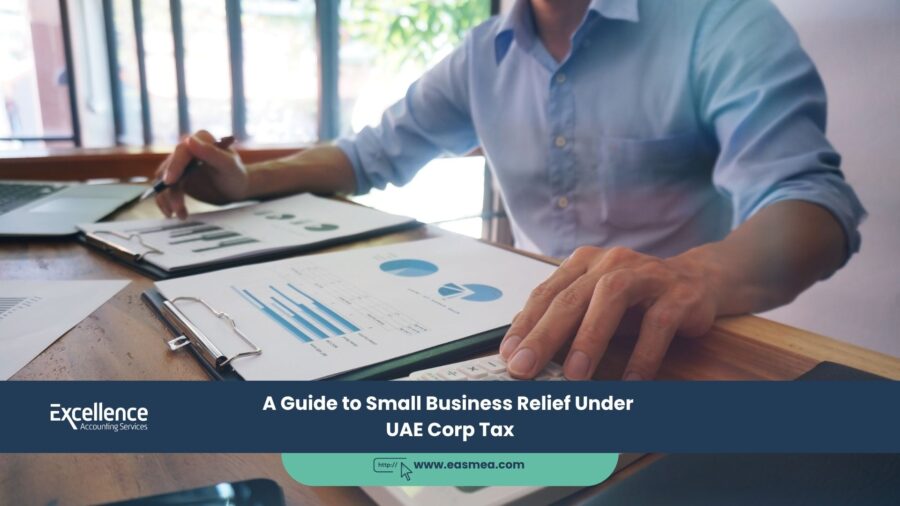A Comprehensive Guide to Small Business Relief Under UAE Corp Tax
The introduction of the UAE’s Corporate Tax regime marked a significant evolution in the nation’s fiscal landscape. For the thousands of small businesses, startups, and SMEs that form the backbone of the economy, the primary concern was the potential impact on their cash flow and administrative load. In recognition of their vital contribution, the Federal Tax Authority (FTA) introduced a pivotal measure: Small Business Relief (SBR). This relief is arguably the single most important provision for smaller enterprises, designed to support their growth by alleviating both their tax burden and compliance complexities.
- A Comprehensive Guide to Small Business Relief Under UAE Corp Tax
- What Exactly is Small Business Relief?
- The Golden Rule: Eligibility Criteria for SBR
- The SBR Election: A Strategic Choice, Not an Automatic Right
- The Foundation of SBR: Impeccable Record-Keeping with Technology
- What Excellence Accounting Services (EAS) Can Offer
- Frequently Asked Questions (FAQs)
- Is Small Business Relief Right for You?
However, SBR is not an automatic exemption. It is an elective regime with specific eligibility criteria, strategic implications, and potential pitfalls. Misunderstanding its rules can lead to a loss of benefits or, worse, non-compliance. This in-depth guide provides a comprehensive overview of Small Business Relief, breaking down who qualifies, how it works, the strategic considerations of electing for it, and the critical role of robust accounting in maintaining eligibility. For any entrepreneur or small business owner in the UAE, a thorough understanding of SBR is not just beneficial—it is fundamental to financial planning and success.
Key Takeaways on Small Business Relief (SBR)
- The Core Benefit: Eligible businesses can elect for SBR to have their taxable income treated as zero, resulting in a AED 0 Corporate Tax liability.
- The AED 3 Million Revenue Threshold: SBR is available to resident businesses whose total revenue in a tax period does not exceed AED 3 million.
- Election is Mandatory: SBR is not automatic. You must make a formal election when filing your Corporate Tax return to receive the benefit.
- Strategic Trade-off: Electing for SBR in a loss-making year means you cannot carry forward those tax losses to offset future profits.
- Record-Keeping is Non-Negotiable: Even with SBR, you are still required to maintain all financial records and documents as per the law.
What Exactly is Small Business Relief?
Small Business Relief is a specific provision within the UAE Corporate Tax law (Article 21 of the Corporate Tax Law and Ministerial Decision No. 73 of 2023) designed to support startups and small businesses. Its primary purpose is to reduce the burden of Corporate Tax and simplify compliance for businesses in their crucial early stages of growth.
The core mechanism is straightforward: if an eligible business elects for SBR, it will be treated as having generated zero taxable income for that specific tax period. This means that regardless of its actual profit, its final tax bill will be AED 0.
This is a powerful tool. A business with AED 2.5 million in revenue and AED 1.5 million in profit would normally pay a significant tax bill. With SBR, that bill becomes zero.
The Golden Rule: Eligibility Criteria for SBR
Eligibility for SBR hinges on meeting a few clear conditions. A business must satisfy all of them to qualify.
1. Residency Status
SBR is only available to a “Resident Person” for Corporate Tax purposes. This generally includes:
- Companies and other legal entities that are incorporated or established in the UAE.
- Foreign companies that are effectively managed and controlled from within the UAE.
Non-resident persons (e.g., a foreign company with a branch in the UAE) are generally not eligible for SBR.
2. The Revenue Threshold
This is the most critical quantitative test. The total revenue of the business in the relevant tax period (and previous tax periods ending on or before 31 December 2026) must not exceed AED 3 million.
- What is ‘Revenue’? Revenue is defined as the gross amount of income derived during a tax period. This includes all income from all business activities before the deduction of any expenses. You cannot use ‘net profit’ for this test.
- The Look-Back and Look-Forward Nature: You must meet the threshold for the current period and all previous applicable periods. This means if your revenue exceeded AED 3 million in a past period, you may be ineligible for SBR in the current period, even if your revenue has since dropped.
3. Exclusions from Eligibility
Certain types of businesses are explicitly excluded from claiming SBR, even if they meet the revenue threshold:
- Qualifying Free Zone Persons (QFZPs): Businesses that have elected for the 0% QFZP regime cannot also claim SBR.
- Members of a Multinational Enterprise (MNE) Group: A UAE business that is part of an MNE group (a group with consolidated revenues over EUR 750 million) is not eligible for SBR.
The SBR Election: A Strategic Choice, Not an Automatic Right
A common misconception is that if your revenue is below AED 3 million, you are automatically exempt from tax. This is incorrect. You must take a deliberate, formal step.
- How to Elect: The election for SBR is made when you submit your annual Corporate Tax return to the FTA. There will be a specific section or checkbox in the return form for this purpose.
- Irrevocable for the Period: Once you file your return and elect for SBR for a given tax period, you cannot change your mind for that period.
- Annual Decision: The decision to elect for SBR is made on a year-by-year basis. You can choose to elect in one year and not in the next, depending on your circumstances.
The Strategic Dilemma: SBR vs. Tax Losses
For a profitable small business, electing for SBR is a clear-cut decision. However, for a business that is making a loss, the choice is more nuanced and requires strategic foresight, often with the help of a CFO service.
The UAE Corporate Tax law allows businesses to carry forward tax losses to offset against taxable profits in future years. This is a valuable asset. However, if you elect for SBR, your taxable income is deemed to be zero, and any tax losses from that period are forfeited.
Scenario Analysis: A Startup’s First Year
Startup Details: Revenue = AED 800,000; Expenses = AED 1,500,000; Net Loss = (AED 700,000).
Option 1: Elect for Small Business Relief
- Taxable Income is treated as AED 0.
- Corporate Tax Due: AED 0.
- The tax loss of AED 700,000 is forfeited and cannot be used in the future.
Option 2: Do NOT Elect for Small Business Relief
- Taxable Income is calculated as (AED 700,000).
- Corporate Tax Due: AED 0 (as there is no profit).
- The tax loss of AED 700,000 can be carried forward to reduce taxable profits in future years. If in Year 2 the startup makes a profit of AED 1,000,000, it can use the loss to reduce its taxable income to AED 300,000.
The Decision: If the startup projects strong growth and expects to exceed the AED 3 million revenue threshold soon, forgoing SBR to preserve the tax loss is a very smart long-term strategy. A detailed feasibility study or financial model is essential for making this choice.
The Foundation of SBR: Impeccable Record-Keeping with Technology
The FTA has been clear: electing for SBR does not exempt you from your administrative duties. You must maintain complete and accurate financial records to prove your eligibility if audited. This is where technology plays a crucial role.
Using an FTA-accredited accounting software like Zoho Books is the most effective way to ensure compliance and build a solid foundation for your tax strategy.
Zoho Books helps you:
- Accurately Track Revenue: With automated invoicing and bank feeds, you have a real-time, accurate measure of your gross revenue, ensuring you know exactly where you stand relative to the AED 3 million threshold.
- Maintain IFRS-Compliant Books: The platform is built on IFRS standards, which is the required standard for Corporate Tax. This ensures your accounting and bookkeeping is compliant from day one.
- Generate Financial Reports Instantly: Produce the Profit & Loss statements and Balance Sheets needed to support your tax return and prove your revenue figures.
- Create an Audit-Ready Trail: Every transaction is recorded, and documents like invoices and receipts can be attached digitally, creating a robust, searchable audit trail. A professional accounting system implementation can ensure this is set up correctly for your business needs.
What Excellence Accounting Services (EAS) Can Offer
Navigating the nuances of Small Business Relief requires more than just reading the law; it requires strategic application. EAS provides tailored services to help small businesses maximize their benefits while ensuring full compliance.
- SBR Eligibility Assessment: We conduct a thorough accounting review to determine if you meet all the criteria for Small Business Relief.
- Strategic Tax Planning: Our core UAE Corporate Tax advisory helps you make the critical decision of whether to elect for SBR or carry forward losses based on your business forecasts.
- Tax Return Filing: We handle the entire process of preparing and filing your annual Corporate Tax return, ensuring the SBR election is made correctly and on time.
- Business Consultancy for Growth: Our business consultancy services help you plan for the day you will outgrow SBR, ensuring a smooth transition into the full tax regime without surprises.
Frequently Asked Questions (FAQs)
It is strictly based on gross revenue. This is the total income generated from all your business activities before any expenses are deducted. Your profit or loss is irrelevant for determining eligibility.
If your revenue exceeds the AED 3 million threshold, even by one dirham, you are not eligible for Small Business Relief for that tax period. You will have to calculate your taxable income and pay the standard corporate tax rates (0% on the first AED 375,000 of profit, and 9% on the rest).
Yes, absolutely. All businesses in the UAE that are subject to Corporate Tax must register with the FTA, regardless of their revenue level or whether they plan to claim SBR. Registration is a mandatory first step.
Yes. You must file a Corporate Tax return for every tax period. The election for SBR is made within this return. Failure to file a return can result in penalties, even if you would have had no tax to pay.
No. The threshold applies to the total revenue of the taxable person (your company) as a whole. You must aggregate the revenue from all your business activities, branches, and divisions to test against the single AED 3 million limit.
To prevent businesses from artificially splitting their operations to stay under the threshold, the law requires you to aggregate your revenue with that of your “connected persons” (e.g., other businesses owned by the same individual or group of individuals) when testing against the AED 3 million threshold.
A Free Zone company can claim SBR, provided it has not elected to be a Qualifying Free Zone Person (QFZP). If a Free Zone company has taxable mainland-sourced income and meets the revenue threshold, SBR could be a viable option instead of the QFZP regime.
You must keep all the same records as any other business. This includes invoices, contracts, bank statements, expense receipts, asset registers, and complete financial statements (P&L, Balance Sheet). The FTA can request to see these records to verify your SBR eligibility.
The Small Business Relief provision is currently set to apply to tax periods ending on or before 31 December 2026. The government will decide closer to the time whether to extend the relief. Businesses should plan for the possibility that SBR may not be available after this date.
Generally, once a tax return is filed, the election (or lack thereof) is final for that period. You may be able to submit a voluntary disclosure to correct an error, but this is a complex process. It is crucial to get expert advice from a tax consultant to ensure the election is made correctly the first time.
Conclusion: SBR as a Strategic Springboard for Growth
Small Business Relief is a testament to the UAE’s commitment to fostering a vibrant and supportive environment for entrepreneurs and SMEs. It provides invaluable breathing room, allowing smaller companies to reinvest their profits, scale their operations, and build a strong foundation. However, to truly benefit, businesses must treat SBR not as a passive exemption but as an active strategic choice. By understanding the eligibility rules, weighing the trade-offs, and underpinning it all with disciplined, technology-enabled accounting, small businesses can leverage this relief to its full potential and pave the way for a prosperous future within the UAE’s evolving tax landscape.




